Open Polytechnic RES420 Fundamentals of Real Estate Assignment 2
VerifiedAdded on 2022/09/08
|7
|1958
|58
Report
AI Summary
This report analyzes the fundamentals of real estate, addressing key aspects of land ownership and property law. Task 1 examines land titles, including ownership rights and restrictions, mortgages, and different types of property interests, such as fee simple absolute, possessory, and leasehold. Task 2 explores the Torrens land transfer system in New Zealand, the roles of various parties in a property transaction, and the registration process. The assignment also discusses assisting new immigrants in the housing market, and provides definitions of real and personal property, ownership, possession, lease, and other relevant terms. Task 3 focuses on forms of co-ownership, including joint tenancy, tenancy in common, civil unions, and trusts. The report also covers the seller's obligations and relevant legislation concerning land ownership and property rights. The assignment draws upon legal and financial concepts to provide a comprehensive overview of real estate principles. The report concludes with a list of references supporting the analysis.
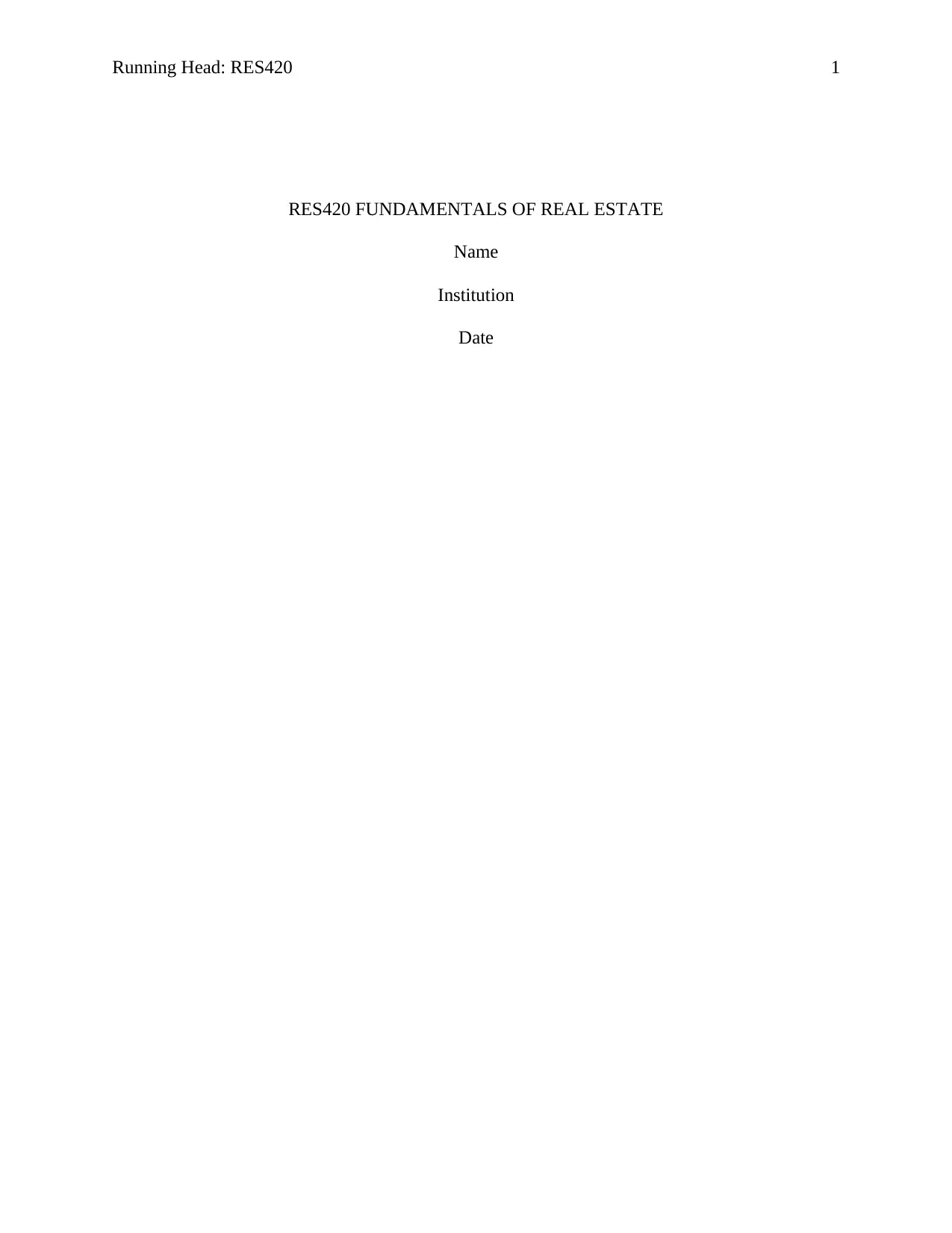
Running Head: RES420 1
RES420 FUNDAMENTALS OF REAL ESTATE
Name
Institution
Date
RES420 FUNDAMENTALS OF REAL ESTATE
Name
Institution
Date
Paraphrase This Document
Need a fresh take? Get an instant paraphrase of this document with our AI Paraphraser
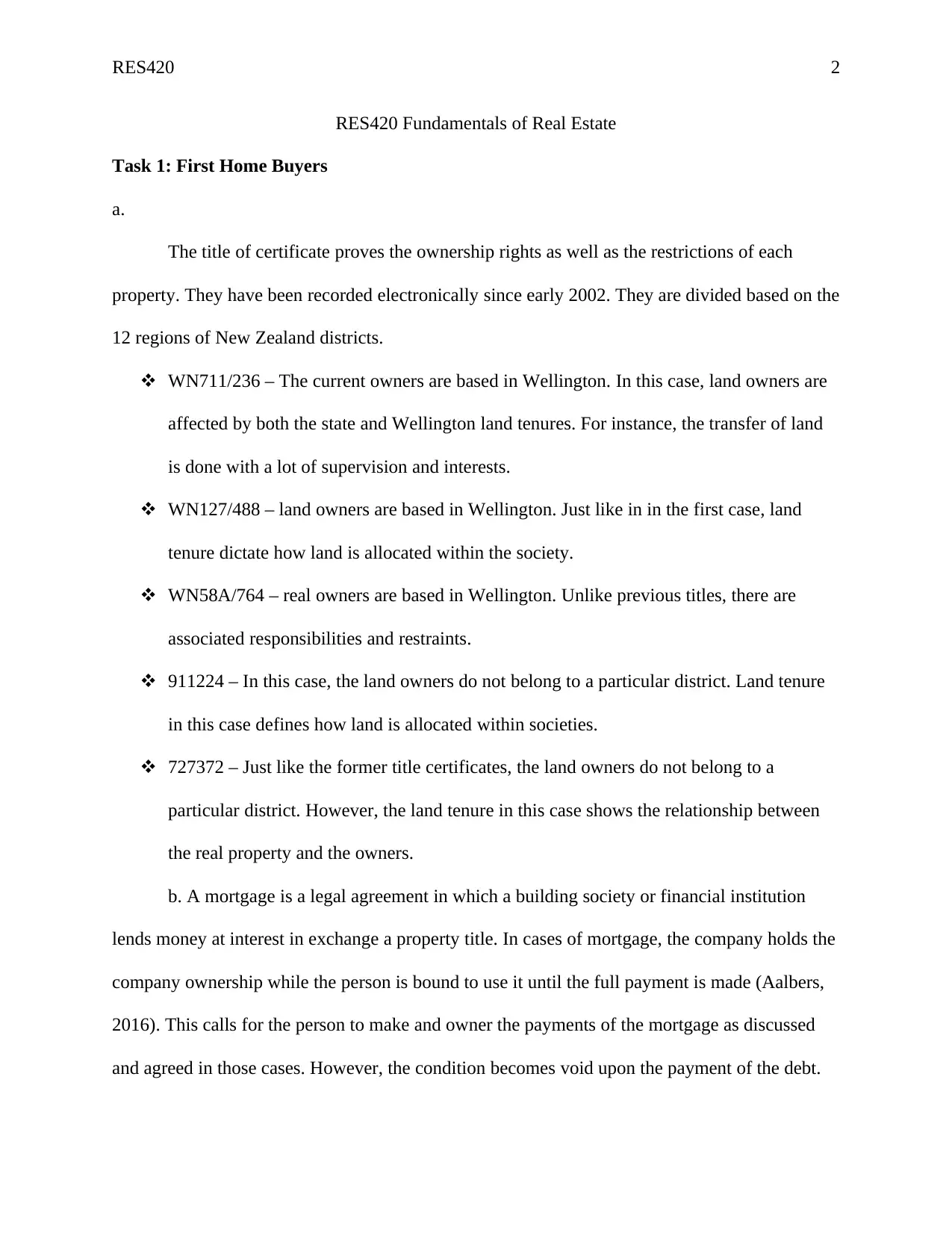
RES420 2
RES420 Fundamentals of Real Estate
Task 1: First Home Buyers
a.
The title of certificate proves the ownership rights as well as the restrictions of each
property. They have been recorded electronically since early 2002. They are divided based on the
12 regions of New Zealand districts.
WN711/236 – The current owners are based in Wellington. In this case, land owners are
affected by both the state and Wellington land tenures. For instance, the transfer of land
is done with a lot of supervision and interests.
WN127/488 – land owners are based in Wellington. Just like in in the first case, land
tenure dictate how land is allocated within the society.
WN58A/764 – real owners are based in Wellington. Unlike previous titles, there are
associated responsibilities and restraints.
911224 – In this case, the land owners do not belong to a particular district. Land tenure
in this case defines how land is allocated within societies.
727372 – Just like the former title certificates, the land owners do not belong to a
particular district. However, the land tenure in this case shows the relationship between
the real property and the owners.
b. A mortgage is a legal agreement in which a building society or financial institution
lends money at interest in exchange a property title. In cases of mortgage, the company holds the
company ownership while the person is bound to use it until the full payment is made (Aalbers,
2016). This calls for the person to make and owner the payments of the mortgage as discussed
and agreed in those cases. However, the condition becomes void upon the payment of the debt.
RES420 Fundamentals of Real Estate
Task 1: First Home Buyers
a.
The title of certificate proves the ownership rights as well as the restrictions of each
property. They have been recorded electronically since early 2002. They are divided based on the
12 regions of New Zealand districts.
WN711/236 – The current owners are based in Wellington. In this case, land owners are
affected by both the state and Wellington land tenures. For instance, the transfer of land
is done with a lot of supervision and interests.
WN127/488 – land owners are based in Wellington. Just like in in the first case, land
tenure dictate how land is allocated within the society.
WN58A/764 – real owners are based in Wellington. Unlike previous titles, there are
associated responsibilities and restraints.
911224 – In this case, the land owners do not belong to a particular district. Land tenure
in this case defines how land is allocated within societies.
727372 – Just like the former title certificates, the land owners do not belong to a
particular district. However, the land tenure in this case shows the relationship between
the real property and the owners.
b. A mortgage is a legal agreement in which a building society or financial institution
lends money at interest in exchange a property title. In cases of mortgage, the company holds the
company ownership while the person is bound to use it until the full payment is made (Aalbers,
2016). This calls for the person to make and owner the payments of the mortgage as discussed
and agreed in those cases. However, the condition becomes void upon the payment of the debt.
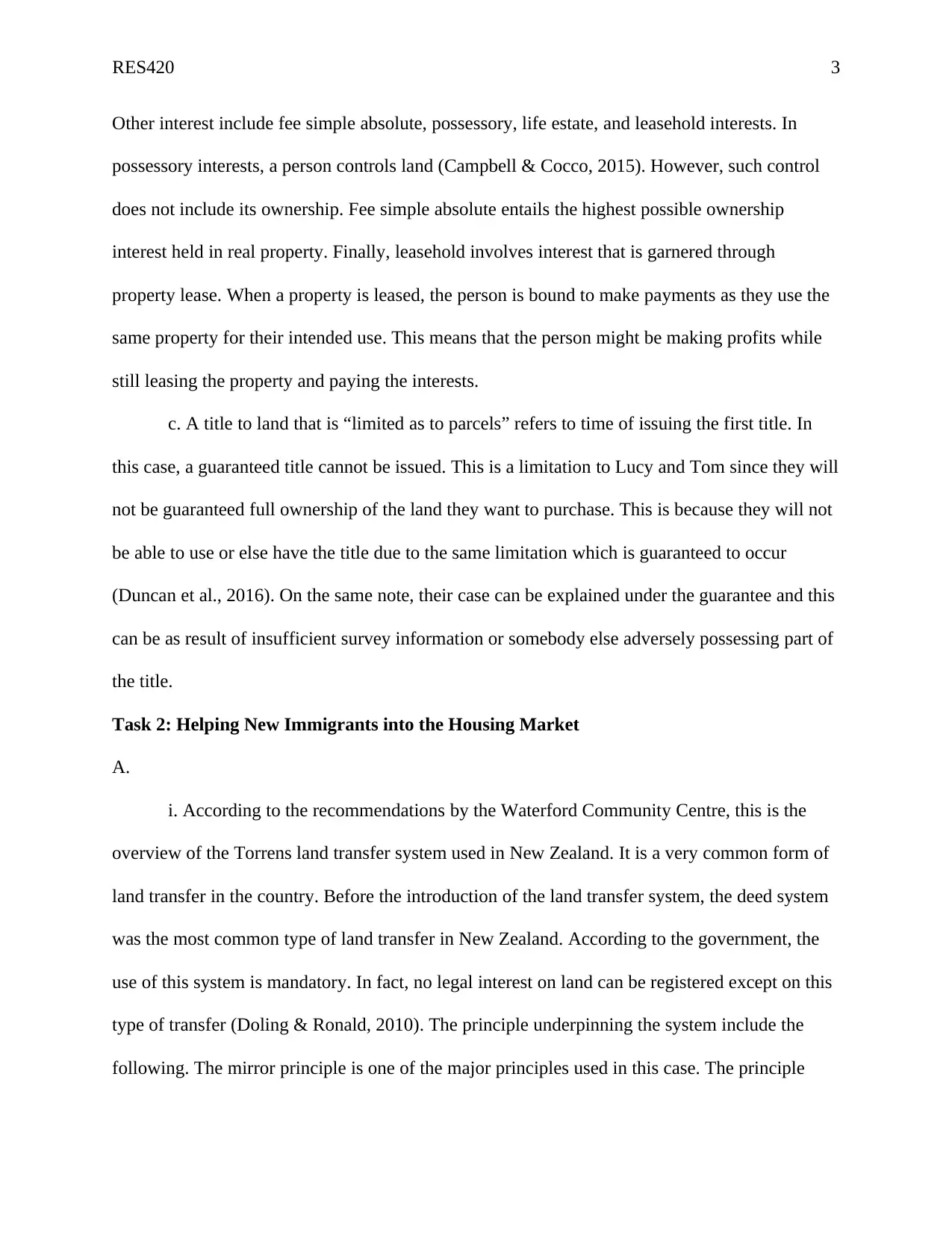
RES420 3
Other interest include fee simple absolute, possessory, life estate, and leasehold interests. In
possessory interests, a person controls land (Campbell & Cocco, 2015). However, such control
does not include its ownership. Fee simple absolute entails the highest possible ownership
interest held in real property. Finally, leasehold involves interest that is garnered through
property lease. When a property is leased, the person is bound to make payments as they use the
same property for their intended use. This means that the person might be making profits while
still leasing the property and paying the interests.
c. A title to land that is “limited as to parcels” refers to time of issuing the first title. In
this case, a guaranteed title cannot be issued. This is a limitation to Lucy and Tom since they will
not be guaranteed full ownership of the land they want to purchase. This is because they will not
be able to use or else have the title due to the same limitation which is guaranteed to occur
(Duncan et al., 2016). On the same note, their case can be explained under the guarantee and this
can be as result of insufficient survey information or somebody else adversely possessing part of
the title.
Task 2: Helping New Immigrants into the Housing Market
A.
i. According to the recommendations by the Waterford Community Centre, this is the
overview of the Torrens land transfer system used in New Zealand. It is a very common form of
land transfer in the country. Before the introduction of the land transfer system, the deed system
was the most common type of land transfer in New Zealand. According to the government, the
use of this system is mandatory. In fact, no legal interest on land can be registered except on this
type of transfer (Doling & Ronald, 2010). The principle underpinning the system include the
following. The mirror principle is one of the major principles used in this case. The principle
Other interest include fee simple absolute, possessory, life estate, and leasehold interests. In
possessory interests, a person controls land (Campbell & Cocco, 2015). However, such control
does not include its ownership. Fee simple absolute entails the highest possible ownership
interest held in real property. Finally, leasehold involves interest that is garnered through
property lease. When a property is leased, the person is bound to make payments as they use the
same property for their intended use. This means that the person might be making profits while
still leasing the property and paying the interests.
c. A title to land that is “limited as to parcels” refers to time of issuing the first title. In
this case, a guaranteed title cannot be issued. This is a limitation to Lucy and Tom since they will
not be guaranteed full ownership of the land they want to purchase. This is because they will not
be able to use or else have the title due to the same limitation which is guaranteed to occur
(Duncan et al., 2016). On the same note, their case can be explained under the guarantee and this
can be as result of insufficient survey information or somebody else adversely possessing part of
the title.
Task 2: Helping New Immigrants into the Housing Market
A.
i. According to the recommendations by the Waterford Community Centre, this is the
overview of the Torrens land transfer system used in New Zealand. It is a very common form of
land transfer in the country. Before the introduction of the land transfer system, the deed system
was the most common type of land transfer in New Zealand. According to the government, the
use of this system is mandatory. In fact, no legal interest on land can be registered except on this
type of transfer (Doling & Ronald, 2010). The principle underpinning the system include the
following. The mirror principle is one of the major principles used in this case. The principle
⊘ This is a preview!⊘
Do you want full access?
Subscribe today to unlock all pages.

Trusted by 1+ million students worldwide
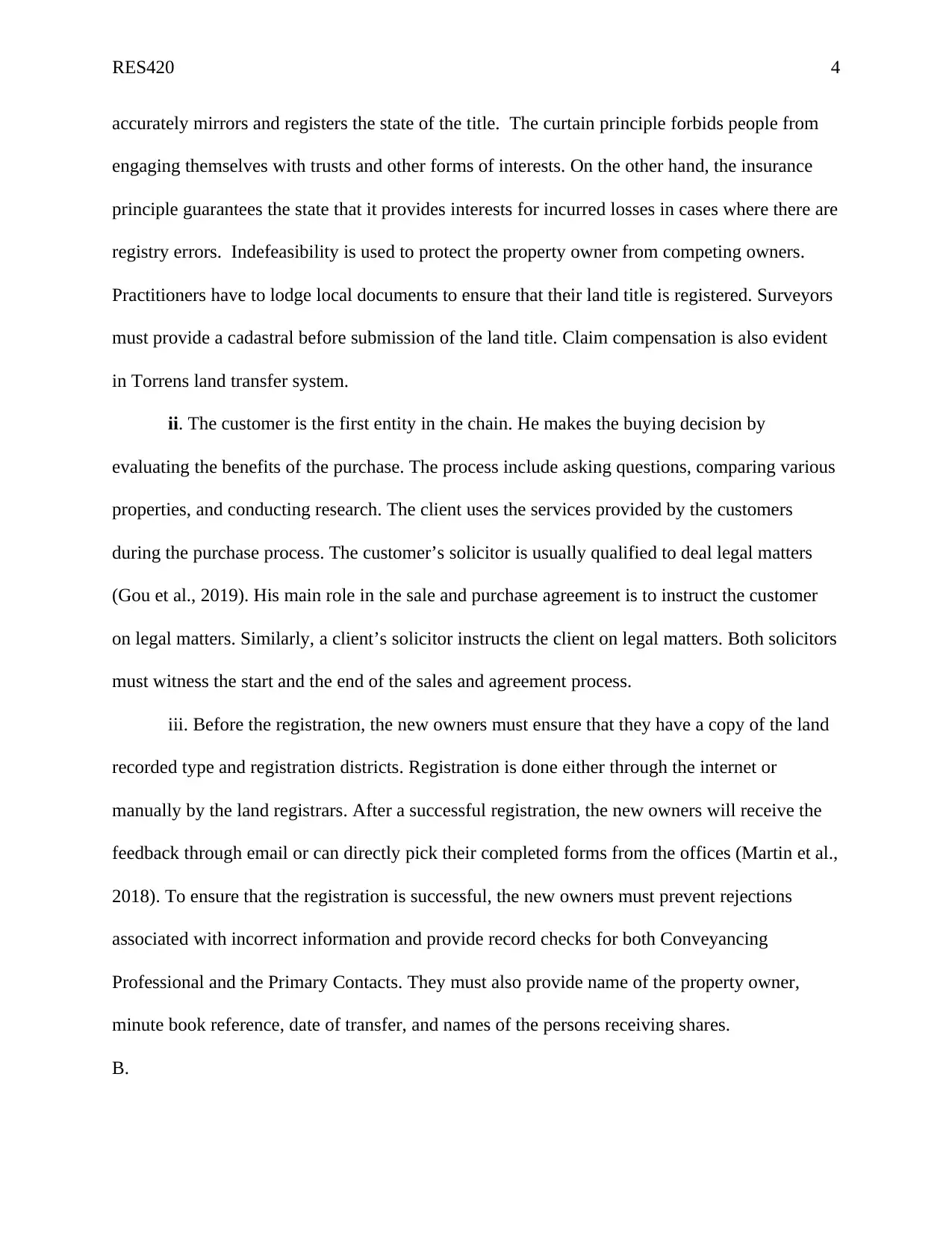
RES420 4
accurately mirrors and registers the state of the title. The curtain principle forbids people from
engaging themselves with trusts and other forms of interests. On the other hand, the insurance
principle guarantees the state that it provides interests for incurred losses in cases where there are
registry errors. Indefeasibility is used to protect the property owner from competing owners.
Practitioners have to lodge local documents to ensure that their land title is registered. Surveyors
must provide a cadastral before submission of the land title. Claim compensation is also evident
in Torrens land transfer system.
ii. The customer is the first entity in the chain. He makes the buying decision by
evaluating the benefits of the purchase. The process include asking questions, comparing various
properties, and conducting research. The client uses the services provided by the customers
during the purchase process. The customer’s solicitor is usually qualified to deal legal matters
(Gou et al., 2019). His main role in the sale and purchase agreement is to instruct the customer
on legal matters. Similarly, a client’s solicitor instructs the client on legal matters. Both solicitors
must witness the start and the end of the sales and agreement process.
iii. Before the registration, the new owners must ensure that they have a copy of the land
recorded type and registration districts. Registration is done either through the internet or
manually by the land registrars. After a successful registration, the new owners will receive the
feedback through email or can directly pick their completed forms from the offices (Martin et al.,
2018). To ensure that the registration is successful, the new owners must prevent rejections
associated with incorrect information and provide record checks for both Conveyancing
Professional and the Primary Contacts. They must also provide name of the property owner,
minute book reference, date of transfer, and names of the persons receiving shares.
B.
accurately mirrors and registers the state of the title. The curtain principle forbids people from
engaging themselves with trusts and other forms of interests. On the other hand, the insurance
principle guarantees the state that it provides interests for incurred losses in cases where there are
registry errors. Indefeasibility is used to protect the property owner from competing owners.
Practitioners have to lodge local documents to ensure that their land title is registered. Surveyors
must provide a cadastral before submission of the land title. Claim compensation is also evident
in Torrens land transfer system.
ii. The customer is the first entity in the chain. He makes the buying decision by
evaluating the benefits of the purchase. The process include asking questions, comparing various
properties, and conducting research. The client uses the services provided by the customers
during the purchase process. The customer’s solicitor is usually qualified to deal legal matters
(Gou et al., 2019). His main role in the sale and purchase agreement is to instruct the customer
on legal matters. Similarly, a client’s solicitor instructs the client on legal matters. Both solicitors
must witness the start and the end of the sales and agreement process.
iii. Before the registration, the new owners must ensure that they have a copy of the land
recorded type and registration districts. Registration is done either through the internet or
manually by the land registrars. After a successful registration, the new owners will receive the
feedback through email or can directly pick their completed forms from the offices (Martin et al.,
2018). To ensure that the registration is successful, the new owners must prevent rejections
associated with incorrect information and provide record checks for both Conveyancing
Professional and the Primary Contacts. They must also provide name of the property owner,
minute book reference, date of transfer, and names of the persons receiving shares.
B.
Paraphrase This Document
Need a fresh take? Get an instant paraphrase of this document with our AI Paraphraser
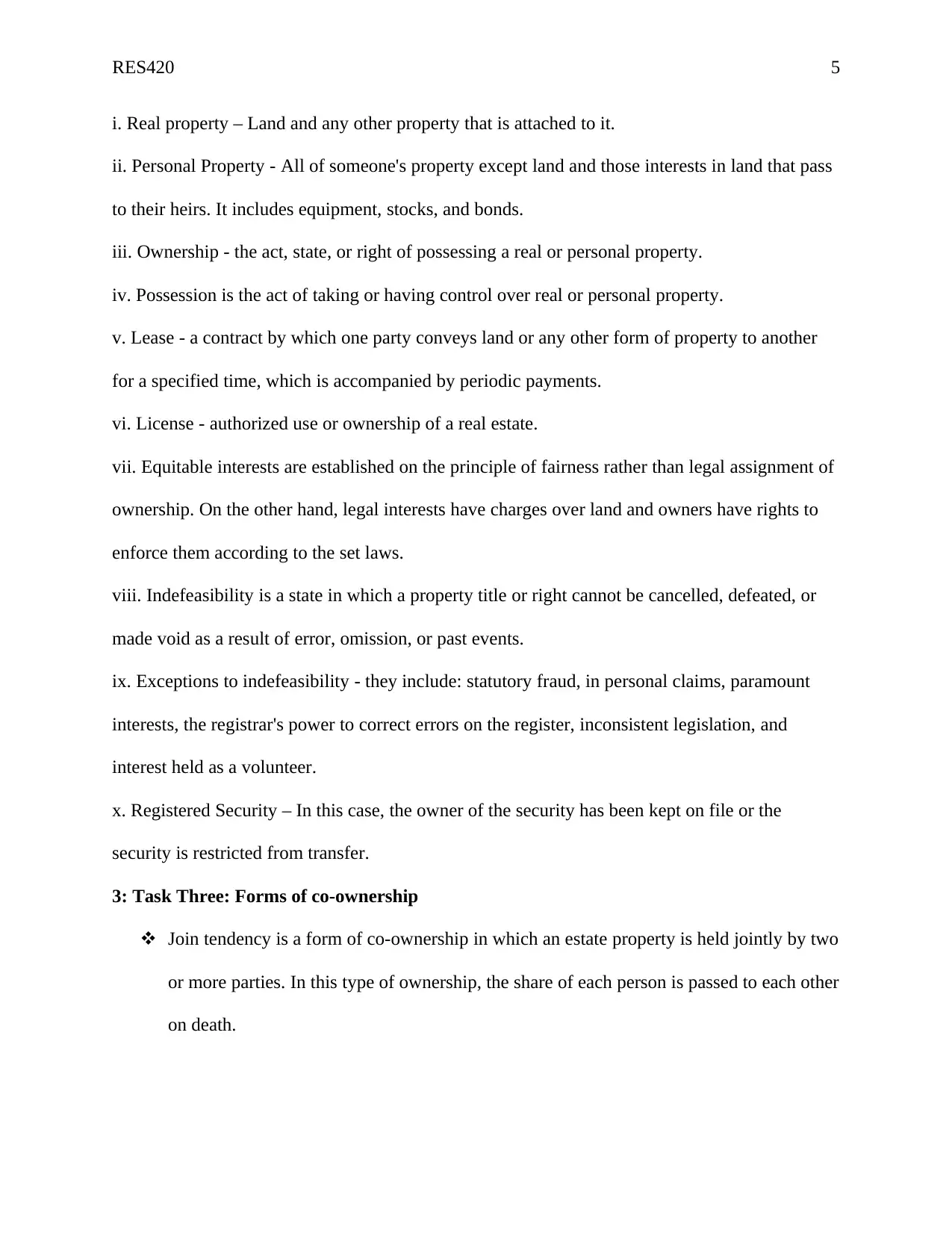
RES420 5
i. Real property – Land and any other property that is attached to it.
ii. Personal Property - All of someone's property except land and those interests in land that pass
to their heirs. It includes equipment, stocks, and bonds.
iii. Ownership - the act, state, or right of possessing a real or personal property.
iv. Possession is the act of taking or having control over real or personal property.
v. Lease - a contract by which one party conveys land or any other form of property to another
for a specified time, which is accompanied by periodic payments.
vi. License - authorized use or ownership of a real estate.
vii. Equitable interests are established on the principle of fairness rather than legal assignment of
ownership. On the other hand, legal interests have charges over land and owners have rights to
enforce them according to the set laws.
viii. Indefeasibility is a state in which a property title or right cannot be cancelled, defeated, or
made void as a result of error, omission, or past events.
ix. Exceptions to indefeasibility - they include: statutory fraud, in personal claims, paramount
interests, the registrar's power to correct errors on the register, inconsistent legislation, and
interest held as a volunteer.
x. Registered Security – In this case, the owner of the security has been kept on file or the
security is restricted from transfer.
3: Task Three: Forms of co-ownership
Join tendency is a form of co-ownership in which an estate property is held jointly by two
or more parties. In this type of ownership, the share of each person is passed to each other
on death.
i. Real property – Land and any other property that is attached to it.
ii. Personal Property - All of someone's property except land and those interests in land that pass
to their heirs. It includes equipment, stocks, and bonds.
iii. Ownership - the act, state, or right of possessing a real or personal property.
iv. Possession is the act of taking or having control over real or personal property.
v. Lease - a contract by which one party conveys land or any other form of property to another
for a specified time, which is accompanied by periodic payments.
vi. License - authorized use or ownership of a real estate.
vii. Equitable interests are established on the principle of fairness rather than legal assignment of
ownership. On the other hand, legal interests have charges over land and owners have rights to
enforce them according to the set laws.
viii. Indefeasibility is a state in which a property title or right cannot be cancelled, defeated, or
made void as a result of error, omission, or past events.
ix. Exceptions to indefeasibility - they include: statutory fraud, in personal claims, paramount
interests, the registrar's power to correct errors on the register, inconsistent legislation, and
interest held as a volunteer.
x. Registered Security – In this case, the owner of the security has been kept on file or the
security is restricted from transfer.
3: Task Three: Forms of co-ownership
Join tendency is a form of co-ownership in which an estate property is held jointly by two
or more parties. In this type of ownership, the share of each person is passed to each other
on death.
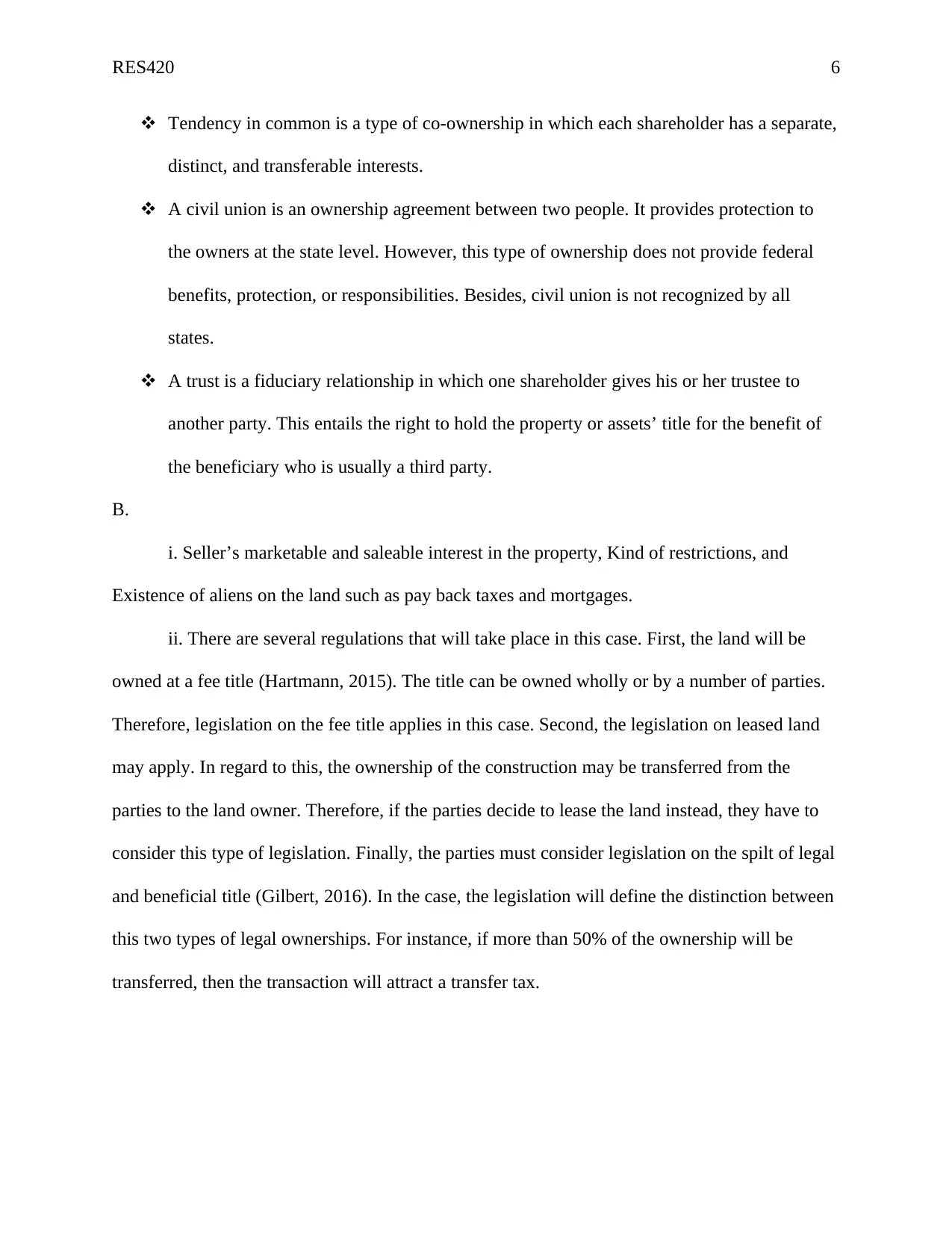
RES420 6
Tendency in common is a type of co-ownership in which each shareholder has a separate,
distinct, and transferable interests.
A civil union is an ownership agreement between two people. It provides protection to
the owners at the state level. However, this type of ownership does not provide federal
benefits, protection, or responsibilities. Besides, civil union is not recognized by all
states.
A trust is a fiduciary relationship in which one shareholder gives his or her trustee to
another party. This entails the right to hold the property or assets’ title for the benefit of
the beneficiary who is usually a third party.
B.
i. Seller’s marketable and saleable interest in the property, Kind of restrictions, and
Existence of aliens on the land such as pay back taxes and mortgages.
ii. There are several regulations that will take place in this case. First, the land will be
owned at a fee title (Hartmann, 2015). The title can be owned wholly or by a number of parties.
Therefore, legislation on the fee title applies in this case. Second, the legislation on leased land
may apply. In regard to this, the ownership of the construction may be transferred from the
parties to the land owner. Therefore, if the parties decide to lease the land instead, they have to
consider this type of legislation. Finally, the parties must consider legislation on the spilt of legal
and beneficial title (Gilbert, 2016). In the case, the legislation will define the distinction between
this two types of legal ownerships. For instance, if more than 50% of the ownership will be
transferred, then the transaction will attract a transfer tax.
Tendency in common is a type of co-ownership in which each shareholder has a separate,
distinct, and transferable interests.
A civil union is an ownership agreement between two people. It provides protection to
the owners at the state level. However, this type of ownership does not provide federal
benefits, protection, or responsibilities. Besides, civil union is not recognized by all
states.
A trust is a fiduciary relationship in which one shareholder gives his or her trustee to
another party. This entails the right to hold the property or assets’ title for the benefit of
the beneficiary who is usually a third party.
B.
i. Seller’s marketable and saleable interest in the property, Kind of restrictions, and
Existence of aliens on the land such as pay back taxes and mortgages.
ii. There are several regulations that will take place in this case. First, the land will be
owned at a fee title (Hartmann, 2015). The title can be owned wholly or by a number of parties.
Therefore, legislation on the fee title applies in this case. Second, the legislation on leased land
may apply. In regard to this, the ownership of the construction may be transferred from the
parties to the land owner. Therefore, if the parties decide to lease the land instead, they have to
consider this type of legislation. Finally, the parties must consider legislation on the spilt of legal
and beneficial title (Gilbert, 2016). In the case, the legislation will define the distinction between
this two types of legal ownerships. For instance, if more than 50% of the ownership will be
transferred, then the transaction will attract a transfer tax.
⊘ This is a preview!⊘
Do you want full access?
Subscribe today to unlock all pages.

Trusted by 1+ million students worldwide
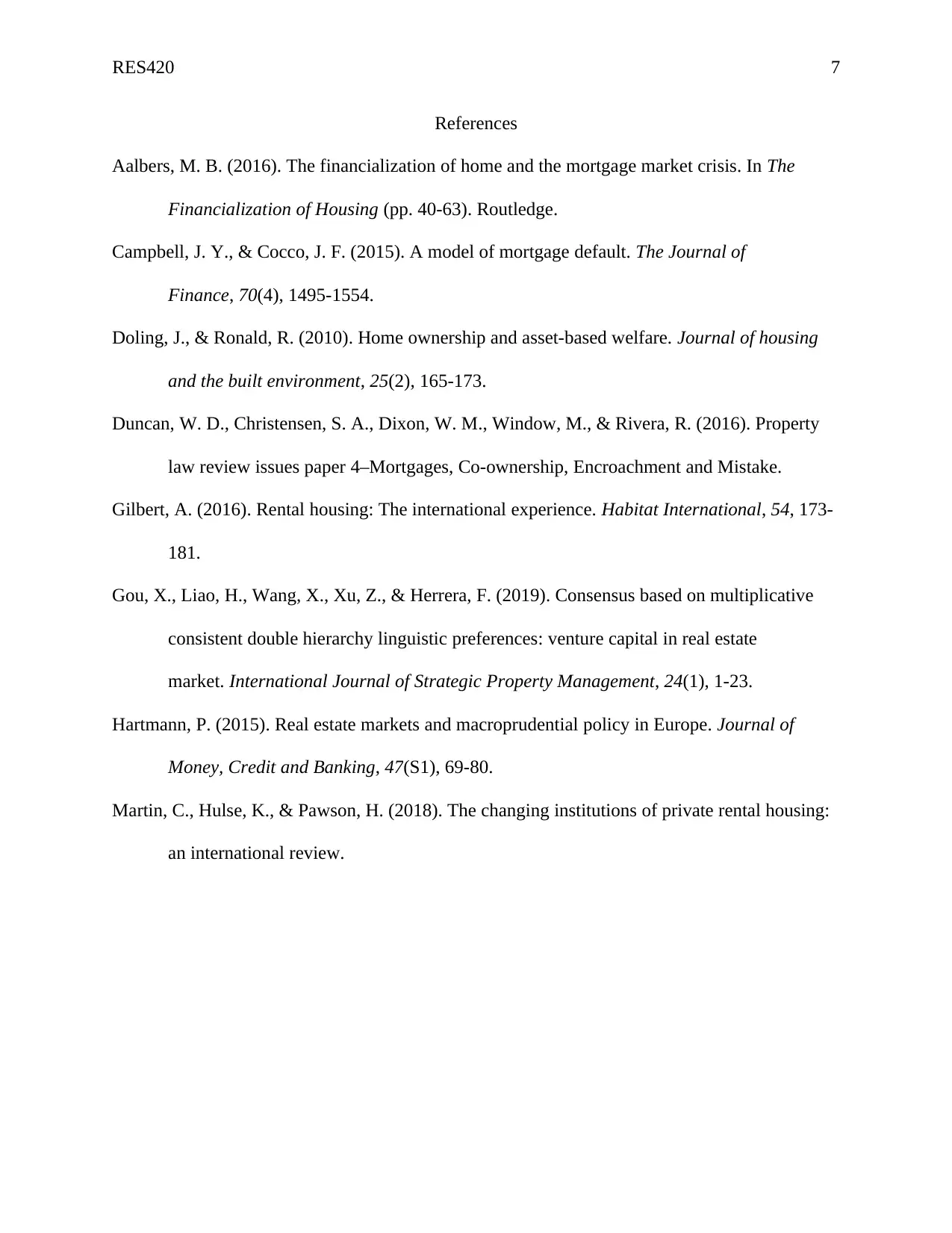
RES420 7
References
Aalbers, M. B. (2016). The financialization of home and the mortgage market crisis. In The
Financialization of Housing (pp. 40-63). Routledge.
Campbell, J. Y., & Cocco, J. F. (2015). A model of mortgage default. The Journal of
Finance, 70(4), 1495-1554.
Doling, J., & Ronald, R. (2010). Home ownership and asset-based welfare. Journal of housing
and the built environment, 25(2), 165-173.
Duncan, W. D., Christensen, S. A., Dixon, W. M., Window, M., & Rivera, R. (2016). Property
law review issues paper 4–Mortgages, Co-ownership, Encroachment and Mistake.
Gilbert, A. (2016). Rental housing: The international experience. Habitat International, 54, 173-
181.
Gou, X., Liao, H., Wang, X., Xu, Z., & Herrera, F. (2019). Consensus based on multiplicative
consistent double hierarchy linguistic preferences: venture capital in real estate
market. International Journal of Strategic Property Management, 24(1), 1-23.
Hartmann, P. (2015). Real estate markets and macroprudential policy in Europe. Journal of
Money, Credit and Banking, 47(S1), 69-80.
Martin, C., Hulse, K., & Pawson, H. (2018). The changing institutions of private rental housing:
an international review.
References
Aalbers, M. B. (2016). The financialization of home and the mortgage market crisis. In The
Financialization of Housing (pp. 40-63). Routledge.
Campbell, J. Y., & Cocco, J. F. (2015). A model of mortgage default. The Journal of
Finance, 70(4), 1495-1554.
Doling, J., & Ronald, R. (2010). Home ownership and asset-based welfare. Journal of housing
and the built environment, 25(2), 165-173.
Duncan, W. D., Christensen, S. A., Dixon, W. M., Window, M., & Rivera, R. (2016). Property
law review issues paper 4–Mortgages, Co-ownership, Encroachment and Mistake.
Gilbert, A. (2016). Rental housing: The international experience. Habitat International, 54, 173-
181.
Gou, X., Liao, H., Wang, X., Xu, Z., & Herrera, F. (2019). Consensus based on multiplicative
consistent double hierarchy linguistic preferences: venture capital in real estate
market. International Journal of Strategic Property Management, 24(1), 1-23.
Hartmann, P. (2015). Real estate markets and macroprudential policy in Europe. Journal of
Money, Credit and Banking, 47(S1), 69-80.
Martin, C., Hulse, K., & Pawson, H. (2018). The changing institutions of private rental housing:
an international review.
1 out of 7
Related Documents
Your All-in-One AI-Powered Toolkit for Academic Success.
+13062052269
info@desklib.com
Available 24*7 on WhatsApp / Email
![[object Object]](/_next/static/media/star-bottom.7253800d.svg)
Unlock your academic potential
Copyright © 2020–2026 A2Z Services. All Rights Reserved. Developed and managed by ZUCOL.





